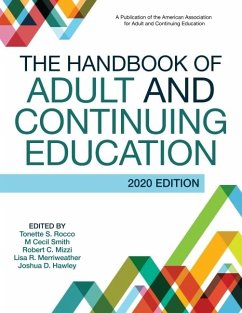Co-published with Colleges and universities areincreasingly becoming significant sites for adult education scholarship-inlarge part due to demographic shifts. With fewer U.S. high school graduates onthe horizon, higher education institutions will need to attract "e;non-traditional"e;(i.e., older) adult learners to remain viable, both financially and politically. There is a need to develop a better corpus of scholarship on topics as diverseas, what learning theories are useful for understanding adult learning? How arehigher education institutions changing in response to the surge of adultstudents? What academic programs are providing better learning and employmentoutcomes for adults in college? Adult education scholars can offer much to thepolicy debates taking place in higher education. A main premise of this handbook isthat adult and continuing education should not simply respond to rapidlychanging social, economic, technological, and political environments across theglobe, but should lead the way in preparing adults to become informed,globally-connected, critical citizens who are knowledgeable, skilled, and openand adaptive to change and uncertainty.The Handbook of Adultand Continuing Education providesrich information on the contemporary issues and trends that are of concern toadult and continuing education, of the programs and resources available toadult learners, and of opportunities to challenge and critique the structuresembedded in the field that perpetuate inequity and social injustice. Adulteducation is a discipline that foresees a better tomorrow, and The Handbook is designed to engage andinspire readers to assist the field to seek new paths in uncertain and complextimes, ask questions, and to help the field flourish.The Handbook is divided into fivesections. The first, Foundationssituates the field by describing the developments, core debates, perspectives,and key principles that form the basis of the field.The second, Understanding Adult Learning, includeschapters on adult learning, adult development, motivation, access,participation, and support of adult learners, and mentoring.Teaching Practices andAdministrative Leadership, the third section, offers chapters on organization andadministration, program planning, assessment and evaluation, teachingperspectives, andragogy and pedagogy, public pedagogy, and digital technologiesfor teaching and learning.The fourth section isFormal and Informal Learning Contexts. Chapters cover adult basic, GED, and literacy education, English-as-a-SecondLanguage Programs, family literacy, prison education, workforce development,military education, international development education, health professionseducation, continuing professional education, higher education, human resourcedevelopment and workplace learning, union and labor education, religious andspiritual education, cultural institutions, environmental education, social andpolitical movements, and peace and conflict education.The concluding Contemporary Issues section discusses decolonizing adult and continuing education, adult education andwelfare, teaching social activism, lesbian, gay, bisexual, trans, queer andstraight allies, gender and its multiple forms, disability, older adults andintergenerational identities, race and ethnicity, working class, whiteness andprivilege, and migrants and migrant education.The editors culminatewith consideration of next steps for adult and continuing education and priorities for the future.
Dieser Download kann aus rechtlichen Gründen nur mit Rechnungsadresse in A, B, BG, CY, CZ, D, DK, EW, E, FIN, F, GR, HR, H, IRL, I, LT, L, LR, M, NL, PL, P, R, S, SLO, SK ausgeliefert werden.

